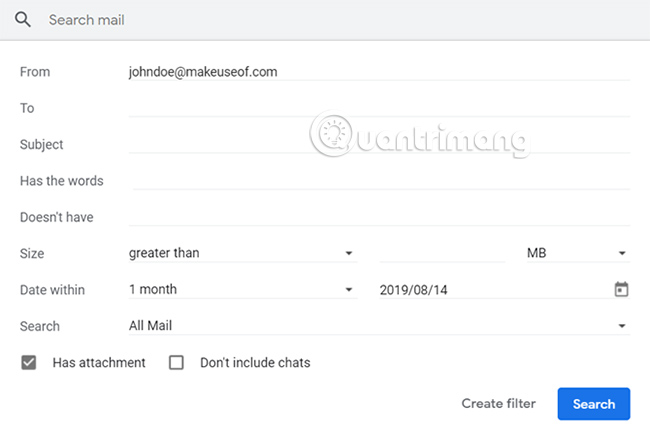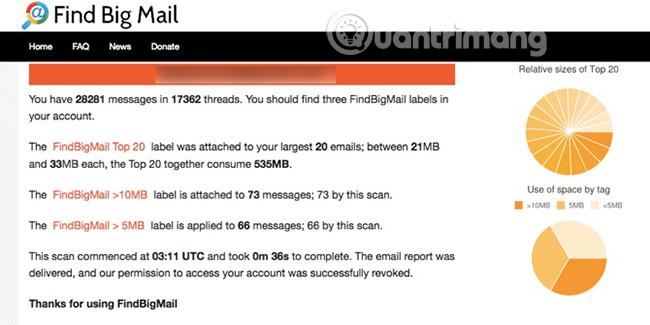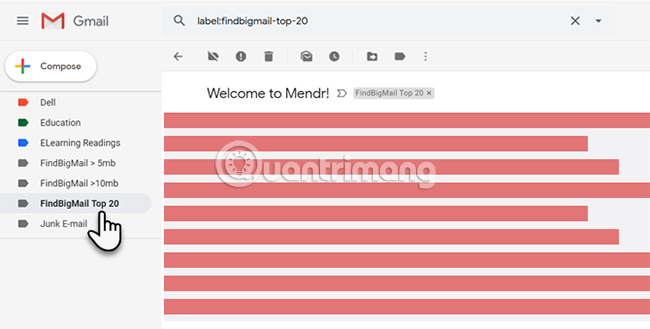How to find email with attachments in Gmail
There are many reasons to love Gmail. First, Gmail is completely free. Second, it gives you POP3 access, as well as free offline access to email via IMAP. Besides, Gmail also has generous storage space to store thousands of attachments.
Thanks to the generosity of Gmail, you can send attachments with a maximum size of 25MB. If the file size is larger, make it turn into a Google Drive link instead of using an attachment. There is no loss of any data in it.
But how do you search for attachments you want to read or remove in Gmail? Let's find answers from TipsMake.com through the following article!
Find attachments in Gmail quickly with the following tips
- Use Gmail's search power
- How to find attachments in Gmail
- See what is attached to Gmail's advanced search feature
- Find large Gmail attachments with Find Big Mail
Use Gmail's search power
Advanced search operators in Gmail act as filters, sorting your Gmail inbox by sender, subject and label.
You don't need to worry too much about large Gmail attachments that will clutter your inbox, until you reach the 15GB limit. This 15GB number is also shared with Google Drive and Google Photos.
Attachments take up a lot of space in your inbox. Suppose someone sent you large images, videos or database files. You may want to search, sort or delete them to save space.
- Find email attachments quickly and efficiently: This is useful when you can't remember the file name, sender's name, the date you received the email, etc.
- Free some space: Very large but limited storage capacity. In case you have ever sent or received large photos, videos or database files in Gmail, you may want to delete them to save space.
Even a beginner should learn basic Gmail-related skills, as it is easier to handle inboxes with fewer mail. That's why you should organize large attachments as soon as possible.
How to find attachments in Gmail
There are several ways to find emails with Gmail attachments with Gmail's advanced search operator or in-app search fields. First, let's start with Gmail's advanced search operators and then the convenience of integrated advanced search fields.
Advanced search operators help you filter specific types of attachments with a few key presses.

1. has: attachment - Filter out emails with anything attached.
2. has: drive | document | spreadsheet | presentation - Filter out emails with Google Drive, Docs, Sheets or Slides attachments or links.
For example, has: drive will filter emails with attachments associated with Google Drive. See screenshot above.
3. filename: .doc - This advanced search operator works almost exactly like the above option (but this operator is documented in the search for attachments).
Note: 'filename:' means there is already an attachment, so you don't need to use 'has: attachment' with it. Also, there is no need for a period before the file extension, ie filename: .doc = filename: doc.
4. filename: google * .doc - Filter out emails with doc files attached and these files have [google] at the beginning of the name (while filename: * google * .doc searches for emails with attachments) The word 'google' mentioned somewhere in the file name).
5. filename: .doc OR filename: .html - Filter out emails with .doc or .html files (or both) attached.
6. filename: .doc AND filename: html - Filter out emails with both .doc or .html files attached.
You can search for email based on capacity. Large emails often have something attached. It could be images or documents. Previously, you had to search in bytes. This makes the user quite confused. Now, you can use any unit and Gmail will search for you. Use 'm' or 'mb' to suggest capacity level.

In addition, you can focus your search on old emails. Use the search object older_than. For example, old_than: 1y will show any email longer than one year.
This method also does not prevent you from using other search parameters to apply any of Gmail's advanced search tips. So use the wildcard or sender name to get the attachment you want.
Gmail also supports 'larger' and 'smaller' parameters to help you find emails within storage. For example, replace numbers 5 and 10 with the number you want:
- larger: 10mb
- Small: 5mb
- And, larger: 5mb smaller: 10mb to find any capacity in the middle of this range.
See what is attached to Gmail's advanced search feature
Use the above operators pretty well. But new users may find it difficult to remember all operators. That's why Gmail's advanced search feature ( Advanced Search ) is proposed.
The Advanced Search dialog box is often ignored, but it's easy to exploit large attachments with it. To find advanced search functionality, click the small arrow next to the Gmail search box.

A total of 10 search fields give you all the combinations you can try. The names of the search parameters will explain what their uses are, and these are the 4 main schools you should pay attention to.
1. Select the Has attachment check box before you try different search parameters in other fields.
2. Next, select 'All Mail' from the Search field or narrow it down with another option in the list of folders. For example, you can choose to search only for attachments or labels you have set up from your unread messages.
3. If you have an attachment of a certain size, use the Size field to enter a number greater or smaller than a certain landmark. You can set the size in MB, KB or byte.
4. Limit your search for a period of time with the Date within field .
5. After filling in all search terms, you can save the filter for future use. Click Create filter. To search instantly, simply click the blue Search button to launch the query.
Emails with attachments will be displayed with the latest emails at the top. You will have to "hunt" the appropriate email attachment, if your search keyword fails. Usually, you may have to look through a few results pages if you have a large mailbox with lots of emails.
Find large Gmail attachments with Find Big Mail
Find Big Mail is a free service that allows you to organize emails by size. It requires access to your Gmail account (using Gmail OAuth2).
Find Big Mail's privacy statement confirms that it does not store your Gmail password and you can ensure access is removed immediately after using it in your Gmail account.
After you grant access to your Gmail account, the tool will immediately start scanning your email. Scanning may take some time. Once done, you will receive an email notification that will take you to the statistics page:

What you can do now is log into your Gmail interface, click through the full label list and find some new labels created by the FindBigMail application.
Labels will organize your largest emails by size:
- Top (the largest email).
- 2mb 'is an email that is larger than 2,000,000 bytes.
- 500kb 'is an email with a capacity of 500,000 to 2,000,000 bytes.
- 100kb 'is an email with a capacity of 100,000 to 500,000 bytes.

Find Big Mail will complete the hard work for you in just a few seconds. Now, just follow these two simple steps to decode your inbox.
1. Click on each label to view large emails with 'bulky' attachments.
2. Then follow the Gmail instructions to delete messages with attachments you no longer want to keep at:
https://support.google.com/mail/answer/7401?hl=en Be sure to clean up the Trash using the 'Delete Forever' option, if you need to free up space immediately. Otherwise, they will be automatically removed within 30 days.
One of the high-capacity attachments appears as a shared image in Gmail. Large report files in PDF format also take up a lot of megabytes. You may need to combine several of them in a new email. So keep a good balance between storing and removing unnecessary emails.
But thanks to these advanced Gmail skills, you no longer have to spend too much time searching for emails.
Hope you are succesful.